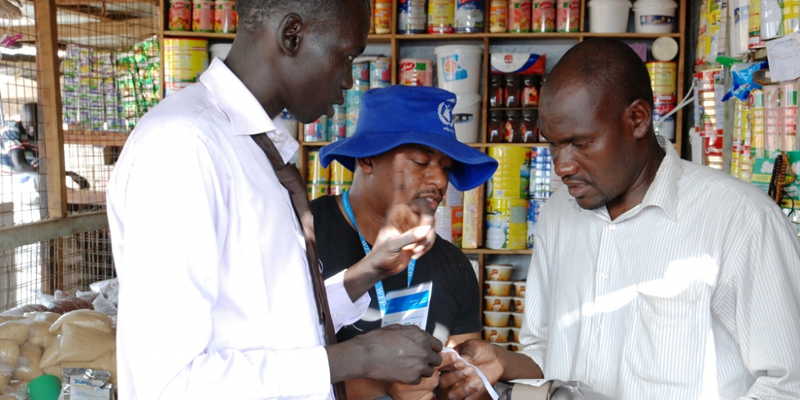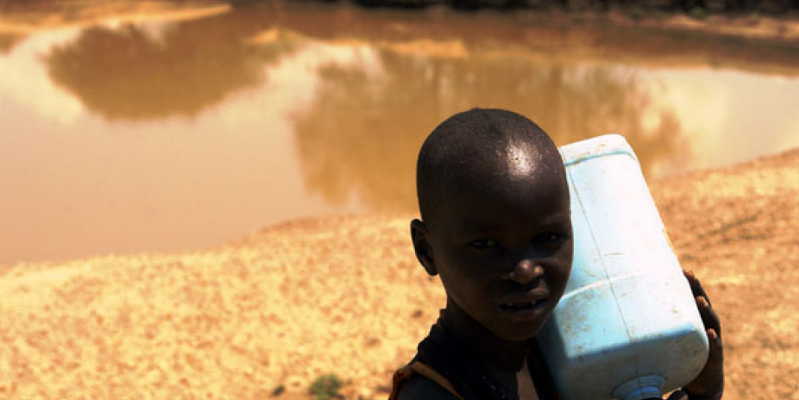News
More refugees in Uganda to get cash for food, says WFP

South Sudan refugees getting food voucher. It is part of a growing trend by UNHCR to transform the food aid regime. PHOTO @UNHCR
UK offers US$21m for refugees and Karamoja
The World Food Programme says it plans to provide up to 140, 000 thousands refugees in Uganda who are receiving cash to buy food from local markets. The measure is meant to ensure that refugees get access to fresh foods but also help support the local economy.
WFP made the announcement following a major donation of US$21m (Approx. Ushs77bn) from the government of the United Kingdom towards emergency food appeals for refugees in Uganda as well as for the crisis prone Karamoja region.
WFP has said in a statement that the UK government provided US$12.4 million for community-based projects and nutrition assistance in Karamoja, and US$9.2 million to help WFP provide lifesaving food assistance for refugees.
“Increasingly, WFP is providing food assistance to refugees through cash transfers so they can buy the food they prefer in the local markets. Cash allows refugees to buy fresh foods and other items to diversify their diets, and stimulates local economies by increasing demand for locally produced food. WFP currently assists 65,000 refugees in Uganda with cash, and plans to expand cash-based assistance to 140,000 people by the end of the year, using funding from UK Aid and other donors,” WFP said in a statement.
Since the late 2000s, WFP has embraced a strategic rethink that has seen World Food Programme (WFP) shift from the concept of food aid to that of food assistance.
“While food aid is a tried and tested model, proudly woven into WFP history, it sprang from a largely unidirectional, top-down vision: people were hungry; we fed them,” the agency wrote in one of its posts on the new approach.
“Food assistance, by contrast, involves a more complex understanding of people’s long-term nutritional needs and of the diverse approaches required to meet them. This conceptual shift has been at the core of WFP’s transformation in recent years. From being “just” the world’s leading humanitarian agency, we have evolved to combine frontline action with the quest for durable solutions.”
“This shift is about recognizing that hunger does not occur in a vacuum. It means we must concentrate time, resources and efforts on the most vulnerable in society. It implies not just emergency interventions, but tailored, multi-year support programmes designed to lift a whole nation’s nutritional indicators. We balance the urgency to alleviate hunger here and now with the broader objective of ending hunger once and for all.
Uganda’s swelling refugee numbers
Latest figures show that Uganda currently hosts more than 700,000 refugees, most of whom rely heavily on WFP’s assistance for survival.
WFP says that the UK Aid funding will help WFP, working closely with the UN refugee agency UNHCR, to provide two types of support for refugees: monthly food assistance – in the form of either food or cash – and livelihoods support aimed at reducing post-harvest food losses.
“WFP needs about US$7 million per month to meet the food needs of more than half a million refugees in Uganda, and these costs will continue to rise as the number of refugees grows,” Sackett said.
Since August, a shortage of funds has forced WFP to cut food assistance in half for all refugees who arrived in Uganda before July 2015 – with the exception of particularly vulnerable groups such as orphans, the elderly, or people who are chronically ill and malnourished – in order to prioritize food assistance for refugees who have arrived more recently.
Despite the donation, WFP says that the reduction shall remain in place, but that the UK Aid funding helps WFP avoid deeper cuts, and enables WFP to continue providing life-saving assistance for people seeking refuge in Uganda from recent conflict erupting in their home countries.
This includes more than 180,000 South Sudanese refugees who have sought shelter in Uganda in the last three months. Uganda is hosting over 300,000 South Sudanese refugees.
WFP also points out that the UK funds will also help sustain WFP’s livelihoods support activities, which assist longer-term refugees and host communities achieve self-reliance and peaceful co-existence.
WFP specifically supports refugees and host communities to reduce post-harvest food losses. Such activities are part of a UN initiative – the Refugee and Host Population Empowerment strategy, or ReHOPE – which supports the government’s Settlement Transformatative Agenda, part of the second National Development Plan.
Karimojong build water ponds
This year the United Kingdom is the second largest contributor to WFP’s programmes in Uganda, and the largest donor to WFP’s nutrition and resilience activities in Karamoja.
WFP says the new UK funds will enable WFP to continue assisting nearly 200,000 people in Karamoja who are participating in the public works programme. The UK contribution will also make it possible for WFP and the Ministry of Health to provide specialized nutritious food to treat 65,000 malnourished children and adults in the region.
“The nutrition and public works activities in Karamoja are assisting Uganda to address chronically high rates of acute malnutrition, while helping communities build their resilience to shocks and stresses by creating productive assets,” Sackett said. These assets include water ponds and irrigation projects. As communities build them, individual households will participate in income-generation activities such as cultivation of vegetables and drought resistant staple crops for consumption and sale.
The UK Aid grant also allows WFP to support the creation of a digital information management system in Karamoja so that the Government and development partners can avoid gaps and duplication in assistance. The new digital system will contain information about social assistance programmes in Karamoja, and highlight which households are receiving support from the various programmes. The system will boost transparency, efficiency and accountability, and provide crucial information for monitoring the effectiveness of programmes.
Comments



















